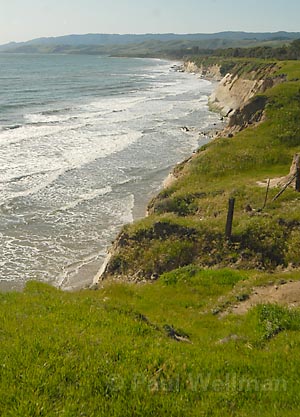Naples: Planners Approve Transfer Ordinance
Critics Worry Voluntary Measure Will Lack Teeth

Arguably one of the biggest central issues in the Naples development debate – the transfer of development rights (TDR) – finally made some real progress this week as the Santa Barbara Planning Commission, after years of working on the subject, approved an actual TDR ordinance on Wednesday afternoon. The TDR, which essentially creates a system for the development of rural open spaces to be “transferred” to established urban areas in such a way that developers on both ends get fairly compensated, had long been considered a potential means of salvation for those opposed to Matt Osgood’s plan to build several dozen mansions on the eastern Gaviota Coast ranch.

However, commissioners ultimately approved an ordinance that, due to its voluntary nature, was deemed “destined to be ineffective and largely toothless” by Environmental Defense Center lawyer Nathan Alley, who represents Surfrider in the fight against Naples construction.
Spurred by a Naples-specific wrinkle in County Coastal Code – which says that in order for the agriculturally zoned Naples property to be rezoned, the county must first deem a TDR infeasible – county staff has been trying to craft an ordinance that fleshes out the specifics of the complex TDR process. This week they did just that and planning commissioners approved, with a 4-1 vote, the specifics of an ordinance that basically allows residential developers to voluntarily pay into a “TDR bank” in order to buy increased density for their building projects in urban areas. Their fees would then be stored, waiting to be used for rural lots that the general public presumably doesn’t want built upon. In early incarnations of the ordinance, urban developers’ participation in a TDR was going to be mandatory if they wished to increase the density of their project – a move that no doubt would have led to a more cash-flush bank.
Ironically, even though the commission abandoned this notion with their final vote this week, a majority of the commissioners – specifically Mike Cooney, who was the lone dissenting vote, and to a lesser degree Cecilia Brown and C.J. Jackson – all expressed concerns about the final ordinance ever being useful due to its voluntary nature. But it was a desire, at least in lip service, to move the process along to the Board of Supervisors sooner rather than later that won out over spending more time on crafting a better program. Lamenting that she “thinks in order for this program to be effective we have to cast the widest net,” Brown defended her vote, calling the ordinance “the only mechanism we have” before adding, “I don’t think not voting for it is going to further the [public’s] interests.” The contradiction of their feelings and their votes was not lost on Alley, who speculated in the aftermath of the hearing that, “I think it is hard to deny the fact that the commissioners are sick and tired of Naples.”
For his part, and also a big indicator of the general direction of the recent six-week run of Naples hearings at the Planning Commission, Osgood said this week, “We are very pleased with the way things are going : This is as good a commission as I’ve ever seen. There haven’t been any decisions that I disagree with.” In addition to approving the developer-friendly TDR ordinance, the commission also voted at a hearing earlier this week, on July 21, to find three of the residences proposed for the hills east of Highway 101 to be in compliance with county land-use codes despite the fact that they are sited in the view shed and potentially intrude in the area’s currently pristine skyline.
Taking a few weeks off to no doubt catch their breath, the Planning Commission will once again be back on the Naples topic on August 13, with hopes of making final recommendations to the Board of Supervisors after their August 27 meeting. Also of note, the County Board of Supervisors will hold a special hearing on August 18 to discuss all things Gaviota – an ambitious talk that will no doubt include substantial Naples discussion.



